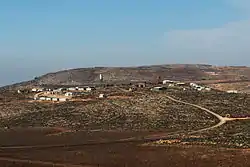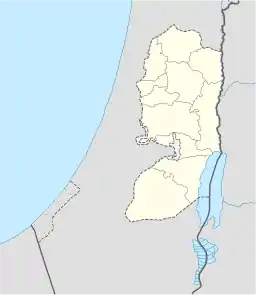Esh Kodesh
Esh Kodesh (Hebrew: אֵשׁ קֹדֶשׁ, lit. Sacred Fire) is an Israeli outpost in the West Bank near Shilo. It falls under the jurisdiction of the Mateh Binyamin Regional Council. The international community considers Israeli settlements in the West Bank illegal under international law, but the Israeli government disputes this.[2] The population in 2005 was under 12 families.[3]
Esh Kodesh
אֵשׁ קֹדֶשׁ, אש קודש | |
|---|---|
 | |
 Esh Kodesh  Esh Kodesh | |
| Coordinates: 32.066824°N 35.336023°E | |
| Council | Mateh Binyamin |
| Region | West Bank |
| Founded | 2000[1] |
History
According to ARIJ, Israel confiscated land from the two Palestinian villages of Jalud and Qusra in order to construct the Israeli outposts of Ahiya and Esh Kodesh.[4]
Esh Kodesh was founded in 2000 near Shvut Rachel,[5] one of several such settlements in the area.[6] It was named for a terrorist victim, Esh Kodesh Gilmore, 25, who was murdered by Palestinian terrorists while working as a security guard at a branch of the National Insurance Institute in East Jerusalem.[7][8] Esh Kodesh is also a book of sermons delivered by the Admor of Piaseczno in the Warsaw Ghetto from the outbreak of World War II in September 1939 until July 1942, when the Jews of the ghetto were deported to the death camp at Treblinka.[9]
To meet the security challenges of living in an area where their presence generates hostility, they have undergone Mishmeret Yesha self-defense training.[10]
In 2010, the Israeli Supreme Court sentenced Zvi Strook, a resident of Esh Kodesh and the son of Orit Strook, head of the Human Rights Organization of Judea and Samaria, to 18 months in prison for the kidnapping and assault of a Palestinian teenager.[11] In 2012, the IDF civil administration ordered Struck to vacate the land of Jalud resident Fauzi Ibrahim, which he had illegally occupied since 2010.[12] Strook appealed the order, and when his appeal was rejected by the IDF appeals committee in 2014, he appealed to the Supreme Court.[12] In December 2015, the Supreme Court rejected his appeal, but granted him 12 months to vacate the land.[12]
In September 2011, the Israel Defense Forces established a base near Esh Kodesh[1] On 23 September 2011, Israeli security forces were called in to break up a clash between the settlers and a group of 300 villagers from Qusra.[13] Due to the growing tension, residents of Qusra armed with flashlights and sticks began to patrol the perimeter of their village at night to thwart possible incursions by Esh Kodesh settlers.[14]
In early January, 2013, after the Israeli High Court of Justice had ruled that the Palestinians of Qusra should be allowed to use one of their fields near Esh Kodesh, the Israeli Border police tried to enforce the ruling. This led to clashes with the Esh Kodesh settlers, leaving two Border Police injured.[15]
On 5 January 2013, approximately 200 Palestinians cut through the fences of the vineyard and attacked the vineyards and residents of Esh Kodesh. 12 outpost residents were injured, with one taken to the hospital. The vineyards were destroyed, a security vehicle was damaged, and the attackers neared homes before the military arrived. The incident was part of a continuing dispute between the Esh Kodesh settlers and nearby Palestinians over land ownership.[16]
Price tag attacks
Israeli settlers from Esh Kodesh have participated in price tag attacks on Palestinian property on the West Bank.[17]
- 3 January 2013 According to Palestinians, in a village south east of Nablus, four cars had their tires slashed, with the words "Solidarity with Esh Kodesh", and a Star of David spray-painted on a nearby wall.[18]
- 7 January 2014. Cars were burnt and price tag graffiti, reading "Esh Kodesh", "revenge", and a Star of David, were sprayed in Madama, Nablus, a Palestinian village south of Nablus.[17][19]
- 8 January 2014. 30 fruit trees were cut down in a Palestinian garden center next to Kfar Qassem. The site was blazed with the slogan "Regards Eish Kodesh."[20]
References
- "New Commander Should Protect Palestinians From Settler Violence". Targeted News Service. November 22, 2011. Retrieved September 9, 2012.
- "The Geneva Convention". BBC News. 10 December 2009. Retrieved 27 November 2010.
- Oded Haklai (June 2007). "Religious—Nationalist Mobilization and State Penetration: Lessons From Jewish Settlers' Activism in Israel and the West Bank". Comparative Political Studies. 40 (6): 713–739. doi:10.1177/0010414006290109.
- Qusra Village Profile, ARIJ, p. 15
- Arieh O'Sullivan (December 4, 2003). "Two empty illegal outposts removed". Jerusalem Post. Retrieved September 9, 2012.
- The extinguishing and rekindling of the `Holy Fire', Haaretz
- NJ man gets green light to pursue terror lawsuit
- Disproportionate number of Anglos slain; Olmert praises families' dignity
- The extinguishing and rekindling of the `Holy Fire', Haaretz
- Matthew Wagner (April 4, 2008). "Jews with guns". Jerusalem Post. Retrieved September 9, 2012.
- Israel Supreme Court extends sentence of settler who assaulted Palestinian, Haaretz
- Amira Hass (December 24, 2015). "Settler Given Year To Remove Vineyard on Palestinian Land". Haaretz.
- While the diplomats haggle, deadly tensions are mounting in the nascent Palestine, The Guardian
- Palestinian statehood bid stokes tensions in West Bank, Washington Post
- Settlers clash with police near Esh Kodesh, 01/02/2013, Jpost
- IDF: 200 Palestinians attack Esh Kodesh vineyards, 01/06/2013, Jpost
- 'Price tag' attack in West Bank following prevented lynch of settlers, Yaakov Lappin, 8 January 2014, Jerusalem Post
- 'Suspected 'price tag' attack near Nablus,' Itamar Fleischman, 3 January 2013, Ynet
- 'Settlers torch 2 Palestinian vehicles near Nablus', 8 January 2014. Ma'an News Agency
- 'Settler 'terror': Price tag in Kfar Qassem, foiled plot against demolisher', Ahiya Raved, 10 January 2014, Ynet